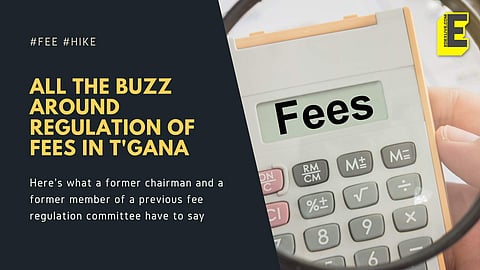

One of the many decisions arrived at by the cabinet meeting of the Government of Telangana on January 17 was the regulation of school fees in private schools, junior and degree colleges. A sub-committee will be formed under Education Minister P Sabitha Indra Reddy and it is entrusted with the responsibility of coming up with guidelines for the same. Here's what Ashish Naredi, former Executive Member of Hyderabad Schools Parents' Association (HSPA), would like to ask. "Why are we talking about sub-committees again? Enough committees and sub-committees have been formed regarding fee regulation and the legislation is already there with the government. I sincerely hope this is not a plan to delay it further," Naredi says.
Naredi is referring to the 2017 Prof Tirupati Rao Committee Report on fee regulation of private schools, a committee chaired by former Vice-Chancellor of Osmania University Prof Tirupati Rao, a committee that Naredi himself was a part of. Once the report was submitted, the government asked the committee to study the issue further. In this way and due to other delays, over six extensions were granted to the committee. The final recommendations have still not been disclosed and HSPA has been asking for them. "The first report had ruffled a lot of feathers, the second report was a watered-down version, which we protested against and so on and so forth. Going by the track record of the government to form committees after committees, we hope that this is the final one," he says.
READ ALSO : Fee hike: How much more will it cost to study BE, MBA in a private institute in Telangana from 2022?
What not to do, what to do
Prof Tirupati Rao says that the task at hand for the sub-committee involves looking at their report, examining what different states have done and the judgments of the Supreme Court and various High Courts regarding the regulation of fees. "Schools should be encouraged towards self-regulation instead of somebody policing them, that was the direction we intended to push them in," he adds. They were many solutions proposed by the committee like all schools submitting their financial statements to a district committee, a slab system where schools are divided into A, B, C or D categories as per their budget, regulation as per inflation index, but all of them were met with protests, he shares. So definitely, that is not the route that the sub-committee should take.
But there are some points that the professor proposes, encompassing all the experience he has amassed in the field, that should lead to an agreeable solution. "Pandemic notwithstanding, there are always 15 to 20 per cent of parents from budget schools who don't pay the fees and yet the school doesn't suspend students. Government must do more to help them. Active participation of parents in the day-to-day activities of the school, like every class having a parent representative on a rotation basis, helps keep all communication clear and clean," Rao says.
Budget schools can't increase their fees because parents will otherwise not be able to afford them. At the same time, they need to keep their teachers and infrastructure up-to-date as per current norms, which requires investment. But how can they do so if they don't increase the fee? If this question is raised, the first answer usually is asking students to go to government schools and Prof Rao calls this a "vicious circle". "But over the years, people have lost trust with regard to the government schools. And to be fair, the government cannot be expected to give education to all. The government and the private sector, both need to work towards it," Rao explains. And as his last suggestion, he says that no matter what, all stakeholders of the education sector have to be involved in the decision-making process. "Only then will the implementation process become slightly simpler," he adds.
Define clearly and then proceed
Citing examples of international schools being brought for Rs 1,600 crore and Rs 700 crore in Hyderabad, Naredi asks, "Who is buying them out if rampant looting, not even profiteering, in the name of collecting fees is involved?" In order to avoid all this, he suggests that the government should begin by defining, in clear terms, what is 'fees'. "This is because each school has its own way of categorising fees by breaking it up into tuition, transport, food and beyond. But having spoken to the management of various schools, no one tracks this. It seems like a gimmick to split it into different heads so that school gets a leeway," he points out. He also cites the example of how, during the pandemic, the government issued an order that allowed only tuition fees to be collected and a few schools included transport and food charges under it as well. Defining terms eliminates the possibility of this happening. Also, there is no way that regulation of fee hikes can be done without the regulation of the base fee, he suggests.
"If the government is looking to bring in fee regulation, let them do it with proper intent while incorporating most, if not all, concerns of the parents. A full audit needs to be done of the existing fee structure charged and then the regulation needs to be decided upon," Naredi says. It may be recalled that HSPA has been advocating for regulation of fees for many years and the decision of regulating fees comes at the same time as the Telangana High Court hearing petitions filed by HSPA regarding the same.
